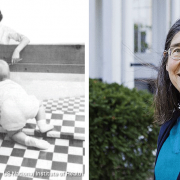December 5, 2023 - 4:00 pm
Singleton Auditorium (46-3002)
Daniel Wolpert, Columbia University
Abstract: Humans spend a lifetime learning, storing and refining a repertoire of motor memories appropriate for the multitude of tasks we perform. However, it is unknown what principle underlies the way our continuous stream of sensorimotor experience is segmented into separate memories and how we...
December 4, 2023 - 4:00 pm
Singleton Auditorium (46-3002)
Dylan Hadfield-Menell (CSAIL)
Abstract: For AI systems to be safe and effective, they need to be aligned with the goals and values of users, designers, and society. In this talk, I will discuss the challenges of AI alignment and go over research directions to develop safe AI systems. I'll begin with theoretical results that...
November 14, 2023 - 4:00 pm
Singleton Auditorium (46-3002)
Peter Dayan, Max Planck Institute for Biological Cybernetics
Abstract:
Much existing work in reinforcement learning involves environments that are either intentionally neutral, lacking a role for cooperation and competition, or intentionally simple, when agents need imagine nothing more than that they are playing versions of themselves or are happily ...
Much existing work in reinforcement learning involves environments that are either intentionally neutral, lacking a role for cooperation and competition, or intentionally simple, when agents need imagine nothing more than that they are playing versions of themselves or are happily ...
September 12, 2023 - 4:00 pm
Singleton Auditorium (46-3002)
Prof. Michael Hasselmo; Director, Center for Systems Neuroscience; Boston University
Abstract: Recordings of neurons in cortical structures in behaving rodents show responses to dimensions of space and time relevant to encoding and retrieval of spatiotemporal trajectories of behavior in episodic memory. This includes the coding of spatial location by grid cells in entorhinal cortex...
May 18, 2023 - 2:00 pm
Singleton Auditorium (46-3002)
Dan Yamins, Stanford University
Abstract: The emerging field of NeuroAI has leveraged techniques from artificial intelligence to model brain data. In this talk, I will show that the connection between neuroscience and AI can be fruitful in both directions. Towards "AI driving neuroscience", I will discuss a new candidate...
May 9, 2023 - 4:00 pm
Singleton Auditorium (46-3002)
Eero Simoncelli, Silver Professor; Professor of Neural Science, Mathematics, Data Science and Psychology, NYU
Abstract: Inference problems in machine or biological vision generally rely on knowledge of prior probabilities, such as spectral or sparsity models. In recent years, machine learning has provided dramatic improvements in most of these problems using artificial neural networks, which are typically...
May 2, 2023 - 4:00 pm
Singleton Auditorium (46-3002)
Jeff Clune, Associate Professor, Computer Science, University of British Columbia; Canada CIFAR AI Chair and...
Abstract: Quality Diversity (QD) algorithms are those that seek to produce a diverse set of high-performing solutions to problems. I will describe them and a number of their positive attributes. I will summarize how they enable robots, after being damaged, to adapt in 1-2 minutes in order to...
April 25, 2023 - 4:00 pm
Singleton Auditorium (46-3002)
Leila Wehbe, Carnegie Mellon University
Abstract: Aligning neural network representations with brain activity measurements is a promising approach for studying the brain. However, it is not always clear what the ability to predict brain activity from neural network representations entails. In this talk, I will describe a line of work...
April 11, 2023 - 4:00 pm
Singleton Auditorium (46-3002)
Elizabeth Spelke, Harvard University
Abstract: More than two decades after her death, Eleanor Gibson still may be the best experimental psychologist ever to work in the developmental cognitive sciences, yet her work appears to have been forgotten, or never learned, by many students and investigators today. Here, drawing on three of...
March 21, 2023 - 4:00 pm
Singleton Auditorium (46-3002)
Chiyuan Zhang, Google
Abstract: Deep learning algorithms are well-known to have a propensity for fitting the training data very well and memorize idiosyncratic properties in the training examples. From a scientific perspective, understanding memorization in deep neural networks shed light on how those models generalize...
February 7, 2023 - 4:00 pm
Singleton Auditorium (46-3002)
Leyla Isik, Johns Hopkins University
Leyla Isik is the Clare Boothe Luce Assistant Professor in the Department of Cognitive Science at Johns Hopkins University. Her research aims to answer the question of how humans extract complex information using a combination of human neuroimaging, intracranial recordings, machine learning, and...
November 22, 2022 - 4:00 pm
Virtual
Margaret Livingstone, Harvard Medical School
Margaret Livingstone is the Takeda Professor of Neurobiology in the Blavatnik Institute of Neurobiology at Harvard Medical School. Livingstone has long been interested in how tuning properties of individual neurons can be clustered at a gross level in the brain. The lab began by looking at the...
November 8, 2022 - 4:00 pm
Singleton Auditorium (46-3002)
Prof. Winrich Freiwald, The Rockefeller University
Current understanding of the neural mechanisms of face processing, and the computational principles they employ, is based, primarily, on studies of a set of fMRI-identified face areas inside macaque inferotemporal cortex. These face areas contain very high fractions of face cells, occur at...
October 18, 2022 - 4:00 pm
Singleton Auditorium (46-3002)
Prof. George Konidaris, Brown University
Abstract: AI is, at once, an immensely successful field---generating remarkable ongoing innovation that powers whole industries---and a complete failure. Despite more than 50 years of study, the field has never settled on a widely accepted, or even well-formulated, definition of its...
April 5, 2022 - 4:30 pm
Dr. Demis Hassabis, Founder and CEO of DeepMind
The Spring 2022 Brains, Minds, and Machines (BMM) Seminar Series will be hosted in a hybrid format. Please see the information included below regarding attending the event either in-person or watch via live stream.
Abstract: The past decade has seen incredible advances in the field of Artificial...
Abstract: The past decade has seen incredible advances in the field of Artificial...















